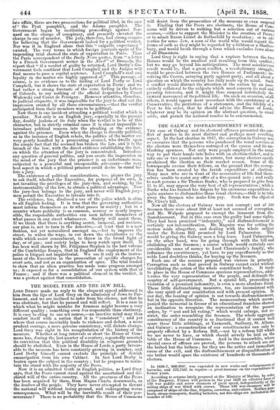THE GALWAY DISFRANCHISEMENT SCHEME.
THE case of Galway and its electoral offences presented the con- flict of parties in its most distinct and perhaps most revolting aspect. At the last election in 1857, the corruption in Galway was so excessive that the persons who purchased the venal services of the electors were themselves outraged at the excess and its un- blushing openness. Not only were people employed in the usual way to put their hands into holes with an election-ticket, and to take one or two pound-notes in return, but many electors openly proclaimed the election as their market season. Some of the townspeople excuse their fellows, on the ground that the corrup- tion has been created by the lavish expenditure at elections. Many men who are in want of the necessaries of life find them- selves unable to resist any offer of a five-pound note ; and really to such persons a Sir Thomas Burke, who is prepared to give from 11. to 51., may appear the very best of all representatives ; while a Burke who has burned his fingers by his enormous expenditure is quite anxious to disfranchise these venal eleetors,—that is to take away the freemen who make him pay. Such was the object of Mr. Clive's bill.
Now all the electors of Galway were not corrupt ; out of 550 freemen there were about 300 at least not accused of corruption, and Mr. Walpole proposed to exempt the innocent from dis- franchisement. But in this case even the guilty had some rights. They had been promised " indemnity," and disfranchisement is certainly not indemnification. Mr. Maguire was for setting the motion aside altogether, and dealing with the whole subject under the Reform Bill promised by Lord Palmerston. This would be giving the Galway men a long lease. Lord Palmerston, on the other hand, was for going through with the bill and abolishing all the freemen ; a course which would certainly save considerable sums of money to Lord Clanricarde's family, who influence the constituency, yet have to pay superfluously as that noble Lord doubtless thinks, for buying up the freemen.
Each one of the courses proposed was vicious in principle. Corruption such as that proved in Galway cannot exist without invalidating the action of the whole constituent body. It tends to place in the House of Commons spurious representatives, adul- terates the very representation of the people, and defrauds the country of self-government. But a special bill, proceeding in violation of a promised indemnity, is even a more absolute fraud. These little disfranchising measures, too, are inconsistent with the very spirit of our constitution and with present opinion. In our day, the leaning of opinion is not towards disfranchisement, but in the opposite direction. The memorandum which accom- panied the memorial in favour of an educational franchise showed an inclination to recognize the representation of the poorest orders, by " scot and lot voting," which would enlarge, not re- strict, the order resembling the freemen. The whole aggregate constituency of the country is so fractional that it cannot well spare these little nibblings, at Yarmouth, Sudbury, St. Albans, and Galway ; a reconstruction of our constituencies can only be properly effected by a Reform Bill,—not by a reform bill which we are never to have, or which should merely be laid on the table of the House of Commons. And in the meanwhile, where special cases of offence are proved, the persons to attack are not the bribed but the bribers ; for they are the active and immediate cause of the evil, and the disfranchisement or disqualification of one briber would spare the existence of hundreds or thousands of electors.
In 1856-7, 808,9961. was expended in new works and enlargements of barracks, and 222,7451. in repairs—a great increase on the expenditure in former years.
According to returns Intel - prepared at the Ministry of of Marine, by order f of the Emperor, France will possess in the year 185 an effective force 150 war paddle and screw steamers of great speed, independently of the sailing ships of war fitted with screws. These 150 war-steamers will be composed of ships-of-the-line., frigates, corvettes, and cutters. Neithq gun" boats, steam-transports, floating batteries, nor fire-ships are included in the number of 150.


























 Previous page
Previous page